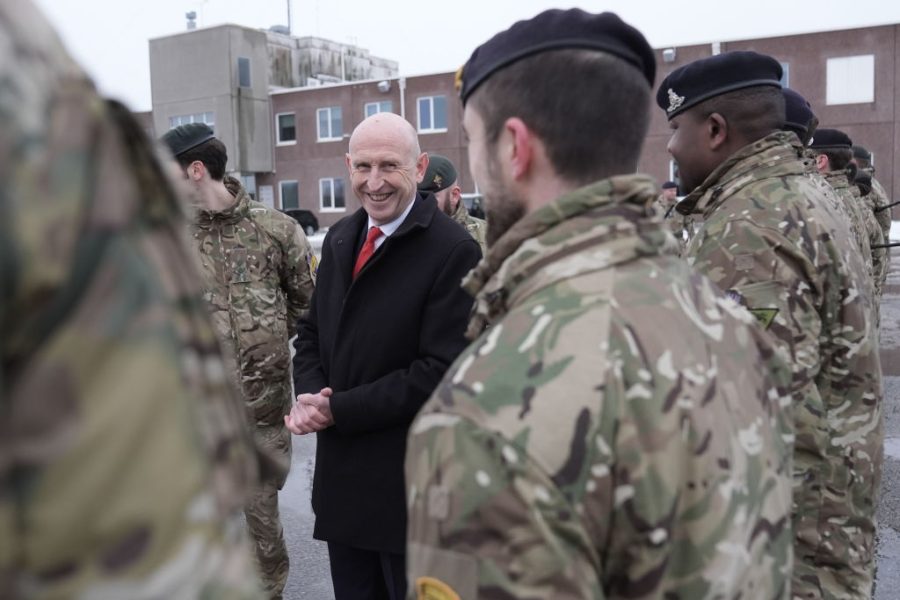Defence Secretary John Healey has raised the possibility that British military personnel could be deployed to Ukraine to carry out training missions. On a visit to Kyiv this week, he spoke about a five-point plan for increasing the United Kingdom’s support for its beleaguered ally, one aspect of which would be to ‘make the training a better fit for what the Ukrainians need’. When he was asked whether that could encompass undertaking the mission in Ukraine rather than the UK, he was careful not to rule it out: ‘We will look wherever we can to respond to what the Ukrainians want. They are the ones fighting.’
Unfortunately, it’s not quite that simple: deploying soldiers to a conflict zone in which we are not a direct combatant always carries a risk. What if a sudden Russian advance puts a Ukrainian unit with British trainers in the firing line? What would the rules of engagement be? What happens if a Russian soldier is shot dead by a member of a British training mission? If botched, there is every chance this deployment could spiral into a direct confrontation between the armies of Britain and Russia.
Healey should be applauded for increasing the Ministry of Defence’s commitment
This won’t, of course, be the first time that the UK has dedicated significant effort to training members of the Ukrainian armed forces. In February 2015, following Russia’s annexation of Crimea, the prime minister David Cameron announced Operation Orbital. This was a mission which would initially see 30 British service personnel deployed to Kyiv to provide medical training, logistics, intelligence analysis and infantry training, the last of which would then be expanded to take the total strength to 75. The short-term training teams were supervised by a headquarters in Kyiv and were kept away from the front line in eastern Ukraine.
Operation Orbital was a valuable commitment and, by 2019, had trained nearly 18,000 Ukrainian soldiers, sailors and airmen. It ended in February 2022 because of fears of Russian military action against Ukraine, which materialised exactly a week later when the invasion began. In June, Boris Johnson announced a new training scheme during a visit to Kyiv and Operation Interflex began in July 2022.
Overseen at first by the Army’s 11th Security Force Assistance Brigade, this has been based in the UK and has included training in the use of UK-supplied equipment, infantry and combat pilot training and assistance in demining. It is now occupying more than a quarter of the British Army’s training estate and has now trained more than 50,000 Ukrainian personnel.
Healey should be applauded for increasing the Ministry of Defence’s commitment. He is right to observe that Ukraine still urgently needs our support and assistance, and also right to imply that if there is a negotiated settlement to the war it is important that Ukraine enters those negotiations in the strongest position possible.
We cannot allow our policy on Ukraine to be dictated or constrained by Vladimir Putin’s specious public professions of Nato ‘threats’ or ‘aggression’. This war of aggression and conquest was started by Russia against a neighbouring sovereign country and we must not for a second allow the Kremlin’s bogus narrative to gain any credibility.
We have also seen repeated instances of Putin drawing a line in the sand and warning the West that to cross it would change the nature of the conflict and escalate it dangerously. He and his Security Council deputy chairman, the loose-lipped and supposedly bibulous Dmitry Medvedev, have suggested more than once that Russia might be ‘provoked’ into the use of nuclear weapons. Consistently, these red lines have proved illusory in the face of determination on the part of the West.
Nevertheless, Nato must be careful to observe the distinction between resolution and recklessness. Logistically there is a strong case for conducting training in Ukraine rather than the UK: a teacher goes to the school rather than inviting pupils to his house. Morally and legally, there is no question of the deployment of training forces to Ukraine representing an act of aggression against Russia (on which charge Putin has no standing in any case). It is, however, a change in stance and the level of our engagement which we need to consider extremely carefully.
The British personnel based in Ukraine under Operation Orbital were few in number and stayed away from the front line. No doubt that would remain the intention if Operation Interflex is expanded in the way that the Defence Secretary has suggested. But even the best military planner cannot guarantee such an operation would be totally risk-free.
In September 1950, US president Harry Truman sent a 65-strong military assistance advisory group to Vietnam in French Indochina to supervise the use of $10 million (£8 million) of military aid to France. The United States withdrew combat forces from Vietnam after the fall of Saigon in April 1975, by which time nearly 60,000 American military personnel had been killed.
Not every conflict, however, is Vietnam. Putting UK personnel into Ukraine to carry out training may be the right thing to do. It does not represent an aggressive act against Russia but inevitably it increases the risk of a direct confrontation between British and Russian soldiers. If we do go ahead with this, the government must put in place unambiguous rules of engagement and it must be prepared for every eventuality. This is a shooting war and accidents happen; if the worst outcome were to come to pass, it would be unforgivable if British soldiers or the British government were taken by surprise.








Comments